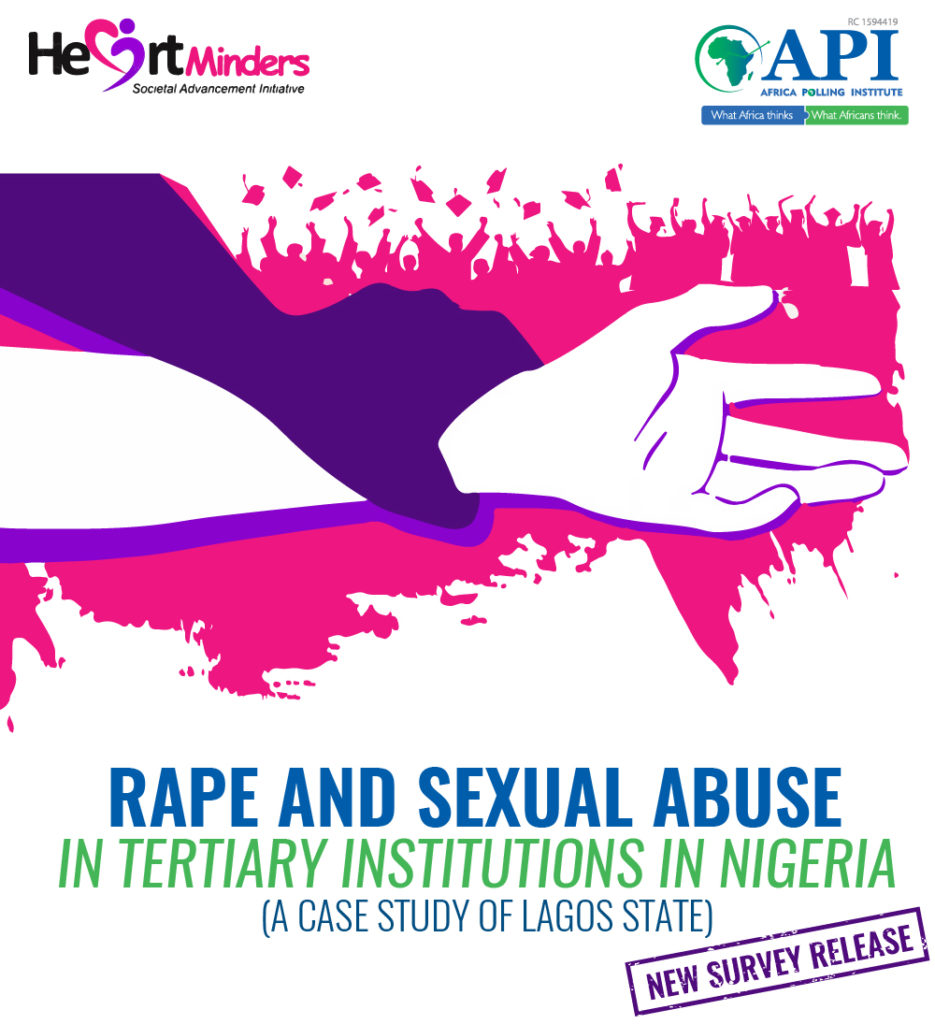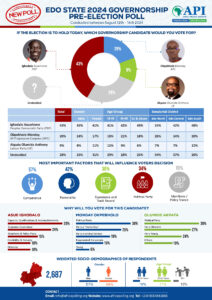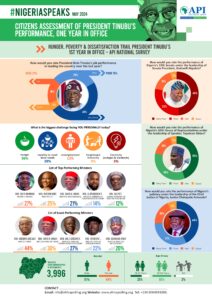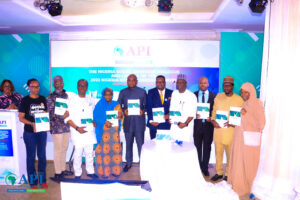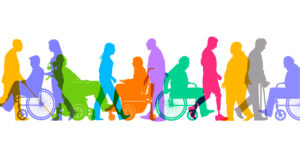Student cultists identified as major perpetrators of sexual abuse on campuses: New Survey
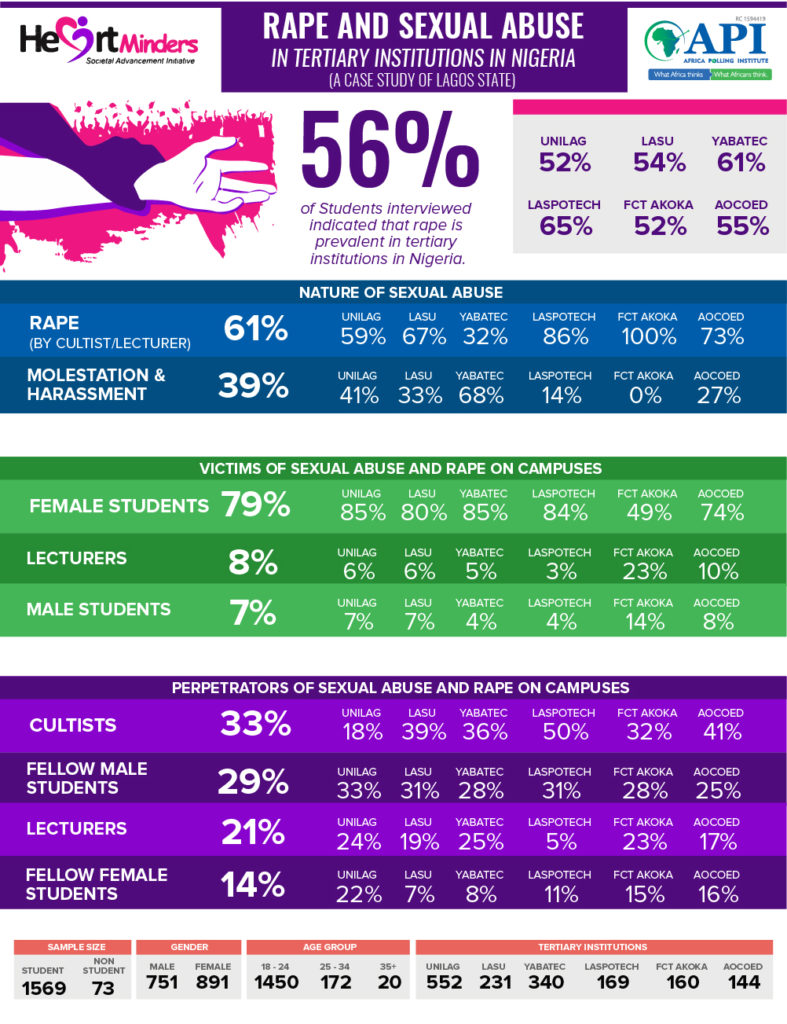
Abuja, Nigeria, December 10th, 2019 – Today, Africa Polling Institute (API) and Heart Minders Advancement Initiative release a collaborative Survey Report on Rape and Sexual Abuse on Tertiary Institutions in Nigeria. The survey report, which focused on six tertiary institutions in Lagos state, has revealed that student cultist and lecturers, are the major perpetrators of rape and sexual abuse on campuses of tertirary institutions (TIs) in Nigeria. This report corroborates the recent BBC Africa Eye Documentary on Sex for Grades, which went undercover to investigate the “open secret” of sexual harassment in Universities in Nigeria and Ghana, West Africa, and to unearth some of the challenges faced by victims of sexual abuse in tertiary institutions.
Tertiary Institutions (TIs) in Nigeria have been at the spotlight in recent times, with increasing allegations of sexual harassments and abuses on campuses. It has been reported that authorities of tertiary institutions have shown very little efforts at addressing the menace; with anectodal evidences revealing that some authorities rebuff reports of sexual abuse and harassment in the spirit of collegial camaraderie. And in some cases, students who reported such cases are further victimized by the same academics, their colleagues, and often the institutions.
To lend our voice on this important subject matter, Africa Polling Institute (API) and the Heart Minders Advancement Initiative recently embarked on a study to gather firsthand information from students of tertiary institutions. The study sought to: (1) examine perceived prevalence of rape and sexual abuse on tertiary institutions, (2) identify reasons for the prevalence and the major perpetrators, (3) measure support for legislation against the menace, and (4) proffer solutions to curbing these reprehensible acts.
Using the convenience sampling technique, a face-to-face survey was conducted on Six Tertiary Institution Campuses within Lagos State, Nigeria’s cosmopolitan city. The following institutions were visited: University of Lagos (UNILAG), Lagos State University (LASU), Yaba College of Technology (YABATEC), Lagos State Polytechnic (LASPOTECH), Federal College of Education (TECHNICAL) Akoka (FCTAKOKA), and Adeniran Ogunsanya College of Education Ijanikin (AOCOED). A total of 1,642 completed interviews were conducted between August 6th and 20th 2019, with all respondents aged 18 years and older.
In unravelling the prevalence of rape and sexual abuse in institutions, the survey revealed that there is a high prevalence of rape and sexual abuse across the six focal TIs studied; as about 61% of students acknowledged the prevalence of sexual abuse on campus, compared to 56% who acknowledged the prevalence of rape. The data suggests that Sexual Abuse is more prevalent than Rape in tertiary institutions; with a 5% difference in prevalence between sexual abuse (61%) and rape (56%).
The survey also sought to understand the reason for the prevalence of rape and sexual abuse on Nigerian campuses. In response, 63% of respondents (who are themselves students) ascribed the prevalence to the increased rate of “Inappropriate and indecent dressing”, especially by female students on campuses. This was followed by those who cited: the increasing rate of drug and substance abuse (36%); Uncontrolled sexual urges (12%); Peer pressure (5%); Cultism (4%); Inadequate campus security (4%) and Indiscipline on the part of some students and lecturers (4%).
Furthermore, the survey revealed that almost 8 in 10 students interviewed (79%) identified “Female Students” as the main victims of rape and sexual abuse or harassment on campuses; while Student Cultists (33%), Fellow Male Students (29%) and Male Lecturers (21%) were identified as the major perpetrators of these reprehensible acts of rape and sexual abuse. Curiously, 14% of respondents stated that some Female Students are also perpetrators of sexual abuse on campus; thus highlighting that the act isn’t carried out by the Men alone, but in some cases, Women are also involved.
In addition, the survey revealed that while “Student Cultists” were identified as the main perpetrators of rape and sexual abuse in LASPOTECH (50%) and Adeniran Ogunsanya College of Education [AOCOED] (41%); “Male Lecturers” were identified as the main perpetrators in YABATEC (25%), UNILAG (24%) and FCTAKOKA (23%). More so, those who indicated fellow Female Students as perpetrators were mainly in UNILAG (22%).
Finally, on what needs to be done to address the prevalence of rape and sexual abuse on campuses, respondents suggested the following: more public enlightenment and advocacy again rape (37%); restriction of indecent and inappropriate dressing, especially on campuses (25%); strict prosecution of rape and sexual abuse offenders (21%); and tighter security within campuses (9%) amongst others. In addition, authorities of tertiary institutions have a huge responsiblitiy of enforcing strict policies and guidelines aimed at curbing incidence of campus cultism. These were the major findings from the survey.
In summary, this report is the outcome of the collaborative social research endeavor of API and Heart Minders; and it represents our humble contribution on this important subject matter. It is our hope that the results and findings of the study would:
- Highlight the menace of rape and sexual abuse on Nigeria’s campuses; and place a heavy burden of responsibility on authorities of Tertiary Institutions to rise up and address the issue decisively;
- Stimulate authorities of Tertiary Institutions to partner with relevant security agencies in the country, in order to engage in more effective enforcement of security within and around campus environments. This is mostly important to curbing campus cultism, as cultists have been identified as one of the major perpetrators of campus rape and sexual abuse.
- Urge Civil Society Organizations (CSOs), Human Rights Groups and relevant stakeholders to intensify their campaign and advocacy against rape and sexual abuse across the country; especially on campuses.
Dr. Bell Ihua
Executive Director, Africa Polling Institute (API)
